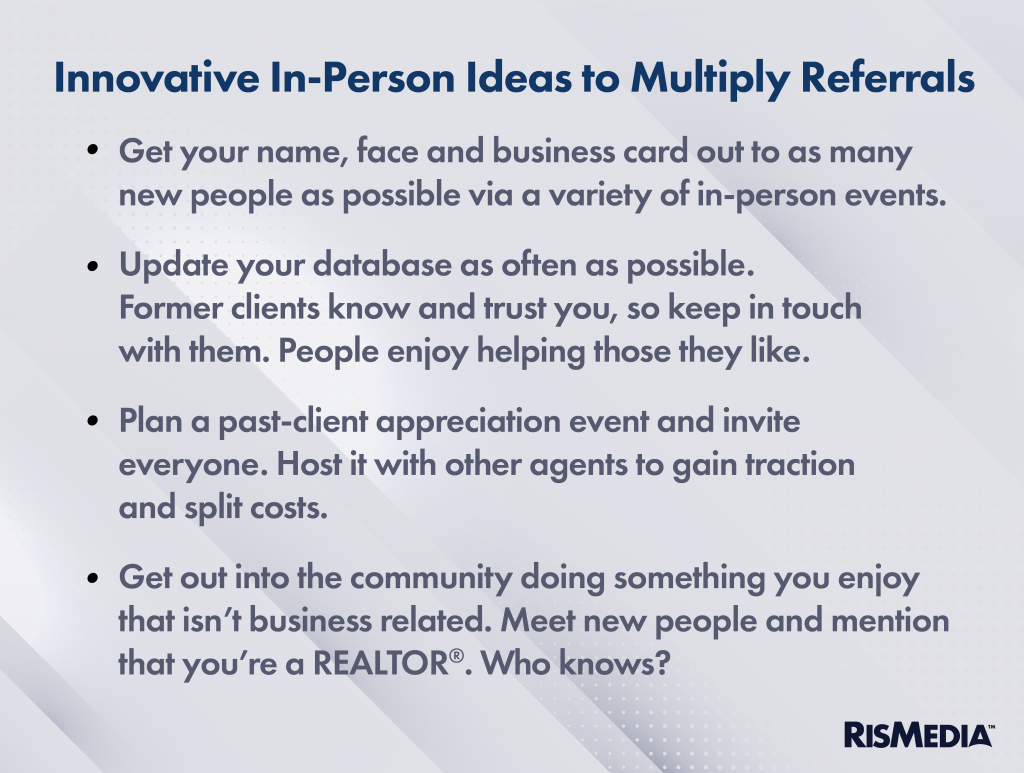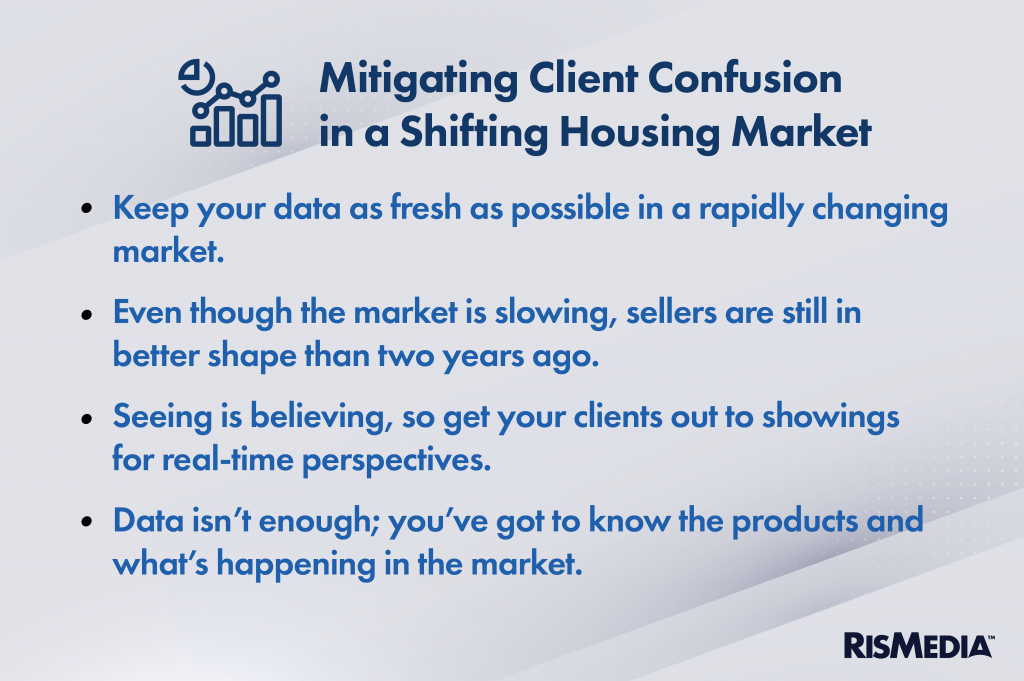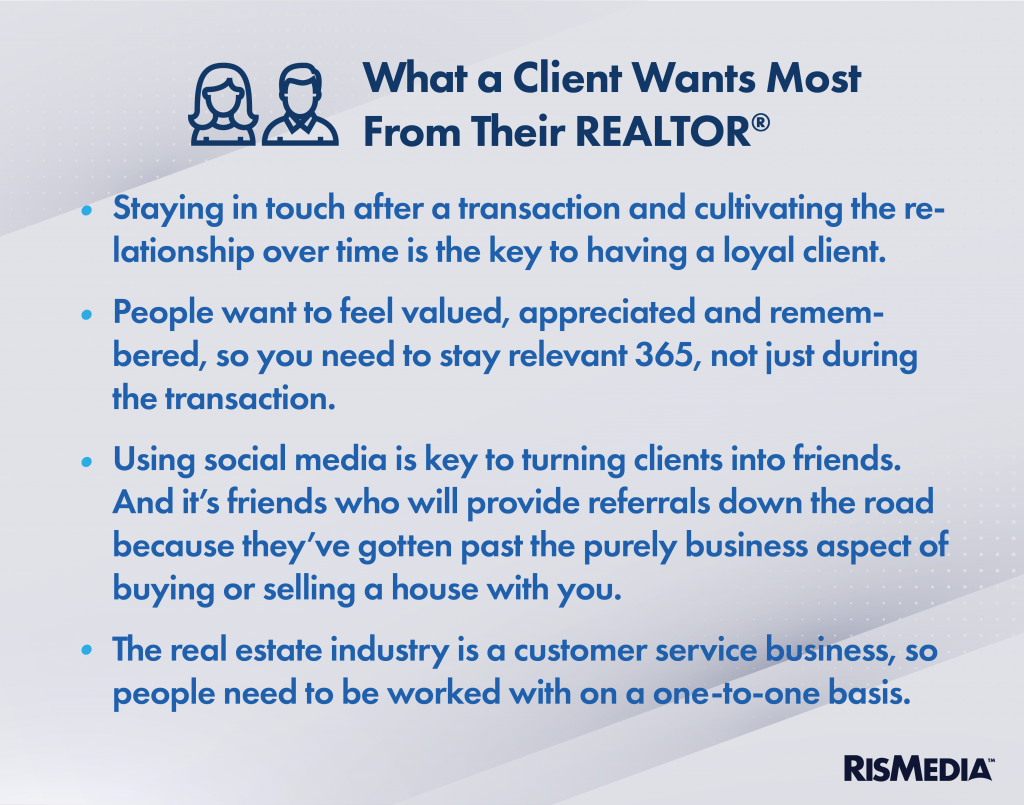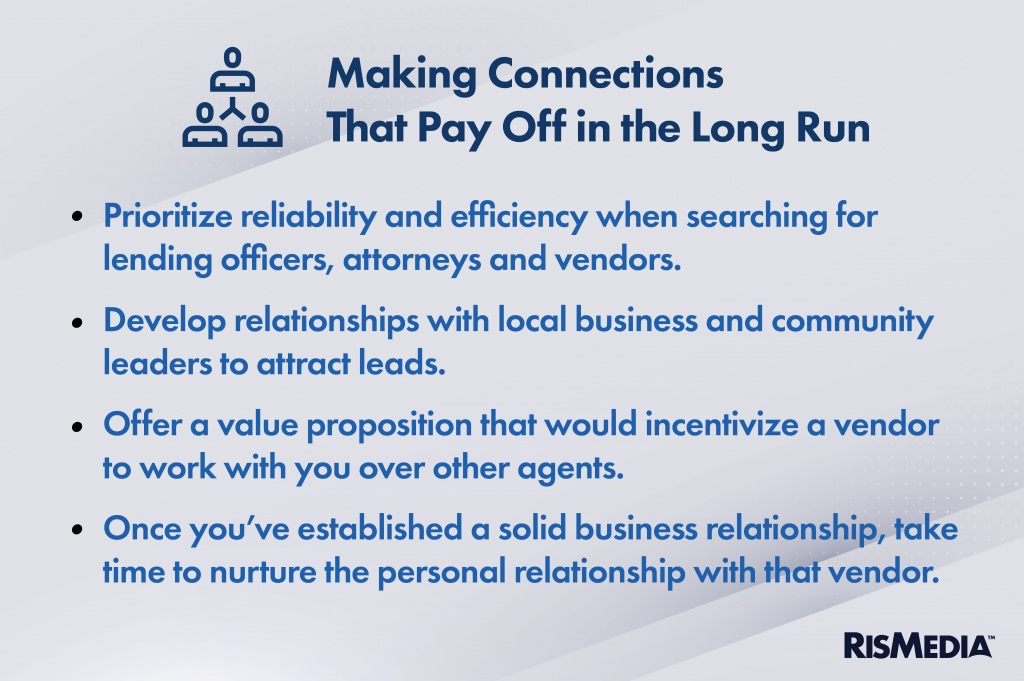
Innovative In-Person Ideas to Multiply Referrals
There’s an old saying that real estate is a “relationship business,” especially when it comes to building a solid pipeline of referrals. A large part of building relationships is about getting “belly-to-belly” with people and talking with people in person.
While the pandemic pushed many agents away from face time and onto FaceTime, that all changed when the U.S. opened back up. Now, recent changes in the housing market have made it imperative that agents get back to building, nurturing and leveraging relationships to feed their businesses.
Whether you’re new to the industry or looking to spruce up your repertoire of skills, here are a few ways that top agents and brokers are using staged events, and getting out to meet people in different settings to get the job done.
“Get into the community you serve,” advises Leah Williamson, an agent with Better Homes and Gardens Real Estate Metro Brokers in the Atlanta, Georgia, area. “For years, I have been getting out to the local police and fire stations and thanking them for their service with goodies, but also leaving a nugget about my business so they will remember me.”
Client relationships are paramount to every agent’s business, but sometimes even the best real estate professionals lose touch with consumers over time. Maintaining and renewing relationships with former clients can be a significant boon for agents who are willing to take the time to reach back out.
“I host a lot of events because they are a great way to drive business,” says Dawn McKenna of the Dawn McKenna Group with Coldwell Banker Realty, Chicago and Naples, Florida. “They are expensive, but they get people’s attention. They make buyers and sellers want to work with our team because they see how dedicated we are to marketing our listings.”
Another novel idea McKenna recommends is hosting panel events at a listing home. She recalls having one with the architect/designer and the interior designer, asking them various questions about how they worked with the homeowner to create the look and feel of the house.
“We got an incredible turnout by sending text messages, e-blasts, personal invitations to clients and brokers in the community, and promoting it on social media,” she says. “By allowing events and different things to happen at your listings, a sale may come in an untraditional way.”
Williamson enthusiastically agrees that in challenging times, creative marketing is a must. A secret agent gathers no leads, so don’t be one. – Michael Catarevas
Key points
- Get your name, face and business card out to as many new people as possible via a variety of in-person events.
- Update your database as often as possible. Former clients know and trust you, so keep in touch with them. People enjoy helping those they like.
- Plan a past-client appreciation event and invite everyone. Host it with other agents to gain traction and split costs.
- Get out into the community doing something you enjoy that isn’t business related. Meet new people and mention that you’re a REALTOR®. Who knows?
“I host a lot of events because they are a great way to drive business. They make buyers and sellers want to work with our team because they see how dedicated we are to marketing our listings.”
-Dawn McKenna, The Dawn McKenna Group, Coldwell Banker Realty
To read the full article, click here.

Mitigating Client Confusion in a Shifting Housing Market
Guiding clients through current and future market shifts takes tact as agents must clarify confusion, break through misconceptions and ultimately help align their client’s mindset toward the current market.
Sellers may not like to hear it, but the days of massive bidding wars that produced offers well above the asking price are gone in many areas of the country.
“Sellers sometimes are not ready to reduce the price, or they are not ready to list at a price that an agent may share with them to sell the property aggressively,” says Alison Elder, founder of the Elder Group Tahoe Real Estate with Berkshire Hathaway HomeServices Drysdale Properties.
That’s mainly attributable to the surge in home prices that the U.S. housing market experienced during the height of the pandemic-induced frenzy, industry professionals say. While the market is shifting, many sellers are stuck in the past regarding their home-price expectations.
“Sellers are using last year’s sales price and data to think that they will have the same sort of sale now,” says Michelle Kim of Long & Foster Real Estate. “They are using prices and the number of days sold from last year to predict what they will get for their homes right now.”
That’s not going to cut it in today’s market. Data is a significant aid while advising sellers, but Kim says that getting some clients up to speed requires fresh numbers.
“I have to advise them and show them much more recent data,” she explains. “I’m really narrowing things down in the last one to two months so that we can stay in front of the market.”
A lot has changed in the past two and a half years. At the height of the pandemic-induced housing market, high demand spurred on by low mortgage rates, low inventory and extra cash in the market helped fuel the buying and refi frenzy that carried the market.
Much of that has dissipated as the market shifted. While agents and brokers understand that is part of the cyclical nature of real estate, consumers may not, according to Elder and Kim.
“Across the board, buyers feel the market is declining, and on a certain level for all of these factors, it probably is,” Elder says.
Surging mortgage rates and elevated inflation have added to the affordability challenge that the double-digit price growth of 2020 and 2021 fueled. As a result, Elder notes that many buyers have been forced to reassess their plans to purchase.
“I often hear from our buyer clients that ‘I don’t want to overpay,’” she says.
For Kim, many buyers are holding out in hopes that a potential housing market crash and a repeat of 2008 will provide a better opportunity to purchase a home.
“They all believe that next year the property values will drop considerably, so they are all waiting to get this amazing deal next year,” Kim says. “I tell homebuyers that no one has a crystal ball, and there’s no guarantee for anything in the future. They have to buy when it is time for them to buy.”
According to Elder, mitigating the confusion among buyers will take some hand-holding.
“What I try to do with every buyer client is educate them on that property, where it sits within the comp range, and then negotiate the best deal that we can for that particular property,” she says.
While some sellers may be eyeing the sidelines as the market conditions continue to shift, Elder suggests that providing some big-picture perspective accompanied by compelling data can help ease some anxiety.
“The sellers have to remember that they have benefited from the explosive pricing increases that COVID and post-COVID have delivered,” Elder says. “I really see this as a wonderful time to sell a property.” – Jordan Grice
Key points
- Keep your data as fresh as possible in a rapidly changing market.
- Even though the market is slowing, sellers are still in better shape than two years ago.
- Seeing is believing, so get your clients out to showings for real-time perspectives.
- Data isn’t enough; you’ve got to know the products and what’s happening in the market.
“I tell homebuyers that no one has a crystal ball, and there’s no guarantee for anything in the future. They have to buy when it is time for them to buy.”
-Michelle Kim, Long & Foster Real Estate
To read the full article, click here.

What a Client Wants Most From Their REALTOR®
Brokers can hold onto their agents through loyalty and constant support. And who’s to argue, since is there any virtue prized more in life than loyalty? It also counts big-time for REALTORS® and their clients when buying and selling houses becomes furiously competitive.
“Loyalty is my favorite when it comes to relationships with all clients, but particularly real estate transactions,” says Leslie Price, a broker/owner with ERA Venture Real Estate in Crossville, Tennessee. “I find that people want to be loyal but can sometimes feel unimportant to their past agent, and that can send them on the hunt for a new one. Becoming someone’s friend during a transaction is easy, but staying in touch after the transaction and cultivating the relationship over time is the key to having a loyal client.”
Knowing that an agent has their back during all the twists and turns throughout the process is not only key to the transaction at hand, but also for solidifying future referrals.
“Clients are quickly realizing that solid agents and solid relationships really do mean something again…and always did,” notes Craig McKenzie, a broker/owner with Better Homes and Gardens Real Estate McKenzie Realty in Oak Harbor, Washington. “Unfortunately, in a fast seller’s market, sellers think every listing agent is a rockstar, as their house is selling above list and with many, many offers. Obviously, reality is now starting to settle back in and, as the tide goes out, the naked are being exposed. Sellers don’t want naked in this market. They want results.”
“People want to feel valued, appreciated and remembered,” stresses Nikki McCarthy, director of marketing at Better Homes and Gardens Real Estate Lifestyles Realty in Jacksonville Beach, Florida. “This life is all about relationships. Putting in the effort to stay engaged with your sphere of influence does pay off in the future. It gives them the confidence to refer you to their friends and family because they know you are going to take great care of them. You need to stay relevant 365, not just during the transaction.”
Adds Jemila Winsey, a broker/owner with ERA Legacy Living in Richmond, Texas: “Loyalty or personal connections are everything. The clients you work with are with you because of you and the experience you provide during and after the transaction. This is the essence of our business.”
It can be challenging for new agents to get new clients and listings when many buyers and sellers decide to use REALTORS® they’ve previously worked with. It’s a big part of the challenge for people breaking into the business.
“I hear people saying they went with an agent because they bought or sold a house with him or her before,” acknowledges Ruba Wight, a property advisor with ERA Cayman Islands. “They feel loyal to them and have known them for years. This mentality makes it challenging for new agents sometimes. Yet, building that trust with close friends does lead them to list their homes with us. Knowing that we want the best for them. That we do care for them.”
Once a successful transaction is over, maintaining connections with clients is vital. One of the easiest ways is utilizing various social media platforms.
“I rely on social media and the importance of an online presence utilizing a digital platform,” agrees Stacey McFadden, a broker associate with Better Homes and Gardens Real Estate Kansas City Homes in Basehor, Kansas. “Loyalty online is equally as important as in person. We live in a digital society. Sharing, commenting and reposting content results in a large client base for my business.” – Michael Catarevas
Key points
- Staying in touch after a transaction and cultivating the relationship over time is the key to having a loyal client.
- People want to feel valued, appreciated and remembered, so you need to stay relevant 365, not just during the transaction.
- Using social media is key to turning clients into friends. And it’s friends who will provide referrals down the road because they’ve gotten past the purely business aspect of buying or selling a house with you.
- The real estate industry is a customer service business, so people need to be worked with on a one-to-one basis.
“Becoming someone’s friend during a transaction is easy, but staying in touch after the transaction and cultivating the relationship over time is the key to having a loyal client.”
-Leslie Price, broker/owner, ERA Venture Real Estate
To read the full article, click here.

Keeping a Seller’s Expectations in Check
Given the complicated state of today’s market, there’s been a lot of uncertainty on both the buyer and seller side. Home prices and mortgage rates continue to fluctuate. Not only have buyers felt pushed out, but sellers are also feeling like they won’t see a return on their investment.
The solution? REALTORS® have to encourage sellers to feel confident in selling their home. Sellers also need to accept reality as far as market expectations are concerned, because there’s a big chance they might not get everything they want.
For sellers who saw others have success during the pandemic boom, Ryan O’Neill, founder of the RE/MAX Advantage Minnesota Team in Bloomington, Minnesota, notes that “Naturally, you feel a little bit short-changed or a little bit slighted.”
However, sellers definitely shouldn’t let that keep them down, because there will always be an opportunity no matter how glum the outlook. O’Neill points out that people will always have to move due to a life event like divorce, jobs, family or something else.
“Even people that think ‘hey, it’s not a good time to sell’ have to remember that isn’t always the case, because in some situations, they might be the only home in that area and price range for a buyer to choose from. So, sellers shouldn’t assume that it’s not going to be a good time,” explains O’Neill.
Ashley Alred, a REALTOR® at The Regal Group in Pullman, Washington, explains that a seller shouldn’t necessarily look at the current market and decide to wait for less uncertainty, because it will almost always be there.
“Uncertainty is something we deal with continually, whether it was 10 years ago or five years ago, no one can predict,” she says.
She adds that while you want to keep a seller realistic, a good way to instill confidence in their sale is by supporting them on their ideas. You can support their higher-priced dreams while having a plan in place in the event they don’t work out.
“One of the tips I tell agents is to have a signed price-reduction form. Agree to the higher price, say I understand and we’ll use this price to start, and set a timeline on how long you’re going to give it,” explains Alred. “It really is a win-win. A seller gets to try what they want to try, but if it doesn’t work, you immediately have a plan ready.
“Obviously you want and hope for the higher price, but you’re still prepared in case it doesn’t work out, and it won’t affect a seller’s drive to sell. Plus, you could have interested parties who were willing to buy and were waiting for the price to come down, who will now buy the property right away.”
O’Neill explains that an agent or broker isn’t a “magician,” and they have to work with what the current market is dictating.
“Of course, that’s not necessarily something we have any control over from a macro level, with interest rates and buyer demand and everything,” continues O’Neill. “Part of the job of the agent is to help the seller understand that piece of the puzzle: that though we can’t control things, one of our jobs, however, is to market the property in the best way possible.”
Most sellers, even if they have some knowledge of real estate, might not fully understand the current state of the market, so it’s important to get on their level and explain the ins and outs of today’s market in a way they understand. O’Neill adds that the market “is what it is,” and “if someone wants to sell, it’s just helping them understand that’s the case.”
There are a lot of different ways to demonstrate to a seller on their level what the market looks like right now, but Alred says that one of the best ways is to show them their competition.
“It is absolutely okay to walk a seller through an active listing in the neighborhood or down the street or across town if they’re not understanding what you are saying about the current market, or they still think they have an inflated price,” says Alred. “You can walk them through a house and say, ‘This is what $500,000 buys you; let’s compare that to your house.’ If a seller actually starts being a shopper, they can be tuned into the competition, which will help keep them realistic.”
Show a seller what the market looks like by showing them their competition. Walk them through current listings in their area to help them visually understand. – Claudia Larsen
Key points
- People will always need to move, so even if the market looks glum, someone will need to buy a house. Also, the market will always be uncertain, so don’t let sellers use that to hold themselves back.
- Encourage a seller’s dream price, but have a backup price-reduction plan in place to prevent loss of confidence if the property doesn’t sell.
- Don’t look at the past. Inflated sales won’t help a seller understand that you aren’t a magician, so show them current sales metrics.
- Get on a seller’s level to explain the state of the market. They don’t need to be sugar coated; they want honesty.
“One of the tips I tell agents is to have a signed price-reduction form. Agree to the higher price, say I understand and we’ll use this price to start, and set a timeline on how long you’re going to give it.”
-Ashley Alred, REALTOR®, The Regal Group
To read the full article, click here.

Making Connections That Pay Off in the Long Run
We all know that real estate is a local business—at times hyperlocal, depending on whom you ask—meaning that the networking you do in your respective markets will be the relationships you’ll most likely leverage as you work with your clients.
With competition for business as fierce as ever, the local relationships you build in your markets will be worth their weight in gold for your businesses.
Most understand the value of building and nurturing relationships, but with a market changing daily, it’s high time folks get a bit of a refresher in networking and building relationships from some of the top agents in their respective markets.
Most agree that everyone should have a few bread-and-butter connections in their back pocket, specifically local vendors who can help close deals.
As one of Central Massachusetts’ top-selling real estate agents, Jason Pincomb of Lamacchia Realty Inc. understands the importance of maintaining control over his transactions. To that end, he stresses the need to build working relationships with lending officers, attorneys and insurance vendors.
“Your relationships with your vendors will be paramount because you’re able to control the deal better,” Pincomb says. “You can receive referrals from them because they know you have their best interest and business in mind as well.”
For Olivia Merrill, a broker associate with The Agency, connecting and leveraging relationships with community leaders has been most beneficial to her business in the Denver market.
“Anytime there is a shifting market, like the one we are in now, the agents who survive the longest are the ones who position themselves as local experts, and the best way to be a local expert is to get entrenched in the community and really understand who the community leaders and business owners are,” Merrill says. “That will set you up for the long term versus just cold-calling or getting third-party leads.
“I’m focused on building the relationship, not so much getting the business, and the way that I do that is I’ll take them out for lunch or dinner one-on-one,” she says.
Similar to working with clients, Merrill notes that she takes every opportunity to learn about each vendor and community leader she meets during lunch and dinner meetings, and follows up after.
Only some vendors or businesses will be the right fit for you and your clients, which means deciding whom to work with will take discernment on the agent’s part, according to Pincomb and Merrill.
While production is a necessary trait to find in a potential partner, Pincomb thinks it’s worth stepping beyond the business side of things when assessing the vendors.
“I have their cell number, and they respond to me,” he says. “They respond to my clients, and they are on their game. My lender doesn’t write a preapproval that is not ready to get it closed. I have never had a deal fall apart in my six years with him.
“I’m also using people I know are knowledgeable about what they are doing,” he continues. “The loan officer that you have to wait Monday through Friday night to hear back from just doesn’t fit for my clients and me, so I’m looking for someone who communicates, gets the job done and is knowledgeable about the industry.”
As you build relationships with vendors and businesses in your markets, you have to offer a value proposition.
Merrill focuses on finding business owners or community leaders through different avenues, including searching the neighborhood board association or a local business in the area.
While many bloggers and influencers often charge businesses to be featured on their platforms, she admits that she does it free for local businesses. “I want to support them and give them business genuinely,” she says. – Jordan Grice
Key points
- Prioritize reliability and efficiency when searching for lending officers, attorneys and vendors.
- Develop relationships with local business and community leaders to attract leads.
- Offer a value proposition that would incentivize a vendor to work with you over other agents.
- Once you’ve established a solid business relationship, take time to nurture the personal relationship with that vendor.
“The agents who survive the longest are the ones who position themselves as local experts, and the best way to be a local expert is to get entrenched in the community and really understand who the community leaders and business owners are.”
-Olivia Merrill, broker associate, The Agency
To read the full article, click here.



